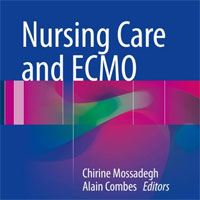Stories Category: Intensive Care

Platelet Function During ECMO in Adult Patients
Employing impedance aggregometry and flow cytometry, we found both impaired platelet aggregation and decreased platelet activation on day 1 of Extracorporeal Membrane Oxygenation (ECMO) support compared with healthy controls.... read more
Implementation of a Standardized Transfusion Protocol for Cardiac Patients Treated With Venoarterial ECMO Is Associated With Decreased Blood Component Utilization and May Improve Clinical Outcome
The data indicate that implementation of a standardized transfusion protocol, using more restrictive transfusion indications in cardiac ECMO patients, was associated with reduced blood product utilization, decreased complications,... read more

Mechanical Ventilation Management during ECMO for ARDS
Ultra-protective lung ventilation on ECMO was largely adopted across medium to high case-volume ECMO centers. In contrast with previous observations, mechanical ventilation settings during ECMO did not impact patients' prognosis... read more

Mechanical Ventilation-induced Diaphragm Atrophy Strongly Impacts Clinical Outcomes
Diaphragm atrophy developing during mechanical ventilation strongly impacts clinical outcomes. Targeting an inspiratory effort level similar to that of healthy subjects at rest might accelerate liberation from ventilation.... read more

Determinants of Health-Related Quality of Life After ICU
Preexisting comorbidity counts, but not severity of ICU illness, are strongly associated with health-related quality of life and physical symptoms in the year following critical illness. We prospectively collected data... read more

The Complex Kinetics of Blood Endocan During the Time Course of Sepsis and ARDS
This study highlights the kinetics of endocan in severe sepsis and acute respiratory distress syndrome (ARDS), thus helping to understand the apparently conflicting results observed in the literature. However, the interpretability... read more

Antipsychotics Not Helpful for Delirium in ICU
Delirium is a confused mental state that includes changes in awareness, thinking, judgment, sleeping patterns, and behavior. It can affect patients of any age but is more common among older adults who experience major illness... read more

Procalcitonin-Guided Use of Antibiotics for Lower Respiratory Tract Infection
The provision of procalcitonin assay results, along with instructions on their interpretation, to emergency department and hospital-based clinicians did not result in less use of antibiotics than did usual care among patients... read more

AKI in Critically Ill Patients After Noncardiac Major Surgery
Acute kidney injury (AKI) is a common complication of major surgery. However, acute kidney injury occurring within the first 48 hours after surgery (early acute kidney injury) and therefore likely related to the surgery itself... read more

Implementation Challenges in the ICU: The Why, Who and How of Daily Interruption of Sedation
Despite apparent consensus, lack of shared understanding of the rationale for an intervention may lead to divergent practice patterns and failure to implement standardized, evidence-based practice. There was wide consensus... read more

Early Mobilization Reduces Duration of Mechanical Ventilation and Intensive Care Unit Stay in Patients With ARF
The introduction of early mobilization for patients with mechanical ventilation (MV) in the ICU shortened MV durations and ICU stays. A multidisciplinary team that includes the patient's family can work together to improve... read more

Association Between Mean Arterial Pressure and AKI and a Composite of Myocardial Injury and Mortality in Postoperative Critically Ill Patients
Hypotension thresholds that provoke renal injury, myocardial injury, and mortality in critical care patients remain unknown. We primarily sought to determine the relationship between hypotension and a composite of myocardial... read more

Effect of a Nurse-Led Preventive Psychological Intervention on Symptoms of PTSD Among Critically Ill Patients
Among critically ill patients in the ICU, a nurse-led preventive, complex psychological intervention did not significantly reduce patient-reported Posttraumatic Stress Disorder (PTSD) symptom severity at 6 months. These findings... read more

Parenteral Anticoagulation Not Associated with Reduced Risk of Ischemic Stroke Among Patients with Atrial Fibrillation During Sepsis
Among patients with Atrial Fibrillation (AF) during sepsis, parenteral anticoagulation was not associated with reduced risk of ischemic stroke and was associated with higher bleeding rates. Of 113,511 patients hospitalized... read more








